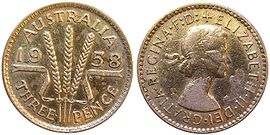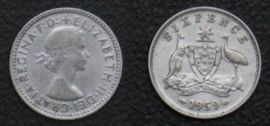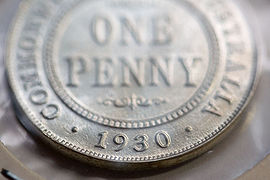
Coins of the Australian pound
Encyclopedia
Federation in 1901 gave the Commonwealth a constitutional power
to issue coins and removed this power from the States. However, British coins continued in use until 1910, when Australian silver coins were introduced. These included florins, shillings, sixpences and threepences. They had a portrait of King Edward VII on one side. Australian pennies and half-pennies were introduced into circulation the following year. In 1931 gold sovereigns stopped being minted in Australia. A crown or five-shilling coin was minted in 1937 and 1938.





 In 1898 the British government allowed two colonies, New South Wales
In 1898 the British government allowed two colonies, New South Wales
and Victoria
, to mint silver and bronze coins at their mints in Sydney and Melbourne respectively.
One coin
highly sought after by collectors is the penny dated 1930. Its rarity is so well-known amongst Australians, that demand for what is akin to a blue chip investment has pushed prices to approximately 26,000 Australian dollars for an average standard example. A proof
example of the same coin recently changed hands for over 620,000 Australian dollars, making it the most expensive copper
coin in the world.
(½d)
Penny
(1d)
Threepence
(3d)
Sixpence
(6d)
Shilling
(1/-)
Florin
(2/-)
See also: Half penny
, Penny
, threepence
, sixpence
, shilling
, florin
, crown.
Section 51(xii) of the Australian Constitution
Section 51 is a subsection of Section 51 of the Constitution of Australia that gives the Commonwealth Parliament the right to legislate with respect to “currency, coinage, and legal tender.”...
to issue coins and removed this power from the States. However, British coins continued in use until 1910, when Australian silver coins were introduced. These included florins, shillings, sixpences and threepences. They had a portrait of King Edward VII on one side. Australian pennies and half-pennies were introduced into circulation the following year. In 1931 gold sovereigns stopped being minted in Australia. A crown or five-shilling coin was minted in 1937 and 1938.
Australian £sd






New South Wales
New South Wales is a state of :Australia, located in the east of the country. It is bordered by Queensland, Victoria and South Australia to the north, south and west respectively. To the east, the state is bordered by the Tasman Sea, which forms part of the Pacific Ocean. New South Wales...
and Victoria
Victoria (Australia)
Victoria is the second most populous state in Australia. Geographically the smallest mainland state, Victoria is bordered by New South Wales, South Australia, and Tasmania on Boundary Islet to the north, west and south respectively....
, to mint silver and bronze coins at their mints in Sydney and Melbourne respectively.
Revaluation
In 1947 due to the cost of WW2 the silver content of the coins was reduced from 0.925 to 0.500 of the coin weight, this lasted until decimalisation of the 14 February 1966.One coin
Coin
A coin is a piece of hard material that is standardized in weight, is produced in large quantities in order to facilitate trade, and primarily can be used as a legal tender token for commerce in the designated country, region, or territory....
highly sought after by collectors is the penny dated 1930. Its rarity is so well-known amongst Australians, that demand for what is akin to a blue chip investment has pushed prices to approximately 26,000 Australian dollars for an average standard example. A proof
Proof coinage
Proof coinage means special early samples of a coin issue, historically made for checking the dies and for archival purposes, but nowadays often struck in greater numbers specially for coin collectors . Many countries now issue them....
example of the same coin recently changed hands for over 620,000 Australian dollars, making it the most expensive copper
Copper
Copper is a chemical element with the symbol Cu and atomic number 29. It is a ductile metal with very high thermal and electrical conductivity. Pure copper is soft and malleable; an exposed surface has a reddish-orange tarnish...
coin in the world.
Coins
Half PennyHalfpenny (Australian)
The Australian Halfpenny was a coin used in the Commonwealth of Australia prior to decimalisation. The coin was first minted in 1911 and stopped being minted in 1964, excluding 1937, 1956 - 1958 inclusive. When the Australian currency was decimalised on 14 February 1966 the coin was equal to ¢.-...
(½d)
Penny
Penny (Australian)
The Australian Penny was a coin of the Australian pound used in the Commonwealth of Australia prior to decimalisation in 1966. It was worth one twelfth of an Australian shilling and 1/240 of an Australian pound...
(1d)
Threepence
Threepence (Australian)
The Australian Threepence was a small silver coin used in the Commonwealth of Australia prior to decimalization. It was minted from 1910 until 1964, excluding 1913, 1929 - 1933 inclusive, 1937, 1945 and 1946...
(3d)
Sixpence
Sixpence (Australian)
The Australian Sixpence was a coin used in the Commonwealth of Australia prior to decimalization. It was minted from 1910 until 1963, excluding 1913, 1915, 1929–33 inclusive, 1937, 1947 and 1949...
(6d)
Shilling
Shilling (Australian)
The Australian Shilling was a coin of the Commonwealth of Australia prior to decimalization. The coin was minted from 1910 until 1963, excluding 1923, 1929, 1930, 1932, 1938, 1947, 1949 and 1951...
(1/-)
Florin
Florin (Australian coin)
The Australian florin was a coin used in the Commonwealth of Australia prior to decimalisation in 1966. The denomination was first minted in 1910, to the same size and weight as the United Kingdom florin. Florins minted from 1910 to 1945 were produced with a .925 sterling silver content, weighing...
(2/-)
| 1910 Series | |||||||
|---|---|---|---|---|---|---|---|
| Value | Diameter | Weight | Composition | Edge | Obverse and Title | Reverse | Minted Year |
| 3 pence | 16 mm | 1.41 g | 92.5% silver Silver Silver is a metallic chemical element with the chemical symbol Ag and atomic number 47. A soft, white, lustrous transition metal, it has the highest electrical conductivity of any element and the highest thermal conductivity of any metal... 7.5% copper Copper Copper is a chemical element with the symbol Cu and atomic number 29. It is a ductile metal with very high thermal and electrical conductivity. Pure copper is soft and malleable; an exposed surface has a reddish-orange tarnish... |
Plain | EDWARDVS VII Edward VII of the United Kingdom Edward VII was King of the United Kingdom and the British Dominions and Emperor of India from 22 January 1901 until his death in 1910... D: G: BRITT: OMN: REX F: D: Fidei defensor Fidei defensor is a Latin title which translates to Defender of the Faith in English and Défenseur de la Foi in French... IND: IMP: Emperor of India Emperor/Empress of India was used as a title by the last Mughal emperor Bahadur Shah II, and revived by the colonial British monarchs during the British Raj in India.... |
1908 coat of arms Coat of arms of Australia The coat of arms of Australia is the official symbol of Australia. The initial coat of arms was granted by King Edward VII on 7 May 1908, and the current version was granted by King George V on 19 September 1912, although the 1908 version continued to be used in some contexts, notably appearing on... |
1910 |
| 6 pence | 19mm | 2.82 g | Reeded | ||||
| 1 shilling | 23.5 mm | 5.65 g | |||||
| 2 shillings = 1 florin | 28.5 mm | 11.31 g |
| 1911 Series | |||||||
|---|---|---|---|---|---|---|---|
| Value | Diameter | Weight | Composition | Edge | Obverse and Title | Reverse | Minted Year |
| ½ penny | 25.5mm | 5.67g | Bronze Bronze Bronze is a metal alloy consisting primarily of copper, usually with tin as the main additive. It is hard and brittle, and it was particularly significant in antiquity, so much so that the Bronze Age was named after the metal... (97% copper, 2.5% zinc, 0.5% tin |
Plain | GEORGIVS V George V of the United Kingdom George V was King of the United Kingdom and the British Dominions, and Emperor of India, from 6 May 1910 through the First World War until his death in 1936.... D. G. BRITT: OMN: REX F. D. Fidei defensor Fidei defensor is a Latin title which translates to Defender of the Faith in English and Défenseur de la Foi in French... IND: IMP: Emperor of India Emperor/Empress of India was used as a title by the last Mughal emperor Bahadur Shah II, and revived by the colonial British monarchs during the British Raj in India.... |
Value | 1911 – 1936 |
| 1 penny | 30.8mm | 9.45g | |||||
| 3 pence | As previous series | 1908 coat of arms Coat of arms of Australia The coat of arms of Australia is the official symbol of Australia. The initial coat of arms was granted by King Edward VII on 7 May 1908, and the current version was granted by King George V on 19 September 1912, although the 1908 version continued to be used in some contexts, notably appearing on... |
|||||
| 6 pence | |||||||
| 1 shilling | |||||||
| 2 shillings = 1 florin | |||||||
| 1937 Series | |||||||
|---|---|---|---|---|---|---|---|
| Value | Diameter | Weight | Composition | Edge | Obverse and Title | Reverse | Minted Year |
| ½ penny | Bronze Bronze Bronze is a metal alloy consisting primarily of copper, usually with tin as the main additive. It is hard and brittle, and it was particularly significant in antiquity, so much so that the Bronze Age was named after the metal... |
GEORGIVS VI George VI of the United Kingdom George VI was King of the United Kingdom and the Dominions of the British Commonwealth from 11 December 1936 until his death... D: G: BR: OMN: REX F: D: Fidei defensor Fidei defensor is a Latin title which translates to Defender of the Faith in English and Défenseur de la Foi in French... IND: IMP: Emperor of India Emperor/Empress of India was used as a title by the last Mughal emperor Bahadur Shah II, and revived by the colonial British monarchs during the British Raj in India.... |
Value | 1938 – 1939 | |||
| ½ penny | Kangaroo Kangaroo A kangaroo is a marsupial from the family Macropodidae . In common use the term is used to describe the largest species from this family, especially those of the genus Macropus, Red Kangaroo, Antilopine Kangaroo, Eastern Grey Kangaroo and Western Grey Kangaroo. Kangaroos are endemic to the country... |
1939 – 1948 | |||||
| 1 penny | 1938 – 1948 | ||||||
| 3 pence | As previous series | three stalks of wheat and a ribbon | 1938 – 1944 | ||||
| 6 pence | 1908 coat of arms Coat of arms of Australia The coat of arms of Australia is the official symbol of Australia. The initial coat of arms was granted by King Edward VII on 7 May 1908, and the current version was granted by King George V on 19 September 1912, although the 1908 version continued to be used in some contexts, notably appearing on... |
1938 – 1945 | |||||
| 1 shilling | Merino ram's Merino The Merino is an economically influential breed of sheep prized for its wool. Merinos are regarded as having some of the finest and softest wool of any sheep... head |
1938 – 1944 | |||||
| 2 shillings = 1 florin | 1912 coat of arms Coat of arms of Australia The coat of arms of Australia is the official symbol of Australia. The initial coat of arms was granted by King Edward VII on 7 May 1908, and the current version was granted by King George V on 19 September 1912, although the 1908 version continued to be used in some contexts, notably appearing on... |
1938 – 1945 | |||||
| 5 shillings = 1 crown | 28.28 g | 92.5% silver Silver Silver is a metallic chemical element with the chemical symbol Ag and atomic number 47. A soft, white, lustrous transition metal, it has the highest electrical conductivity of any element and the highest thermal conductivity of any metal... 7.5% copper |
Milled | Crown | 1937 – 1938 | ||
| 1945, 1949, 1953, 1955 Series | ||||||||
|---|---|---|---|---|---|---|---|---|
| Series | Composition | Obverse and Title | ½d | 1d | 3d | 6d | 1s | 2s |
| 1946 | 50% silver Silver Silver is a metallic chemical element with the chemical symbol Ag and atomic number 47. A soft, white, lustrous transition metal, it has the highest electrical conductivity of any element and the highest thermal conductivity of any metal... , 40% copper Copper Copper is a chemical element with the symbol Cu and atomic number 29. It is a ductile metal with very high thermal and electrical conductivity. Pure copper is soft and malleable; an exposed surface has a reddish-orange tarnish... , 5% zinc Zinc Zinc , or spelter , is a metallic chemical element; it has the symbol Zn and atomic number 30. It is the first element in group 12 of the periodic table. Zinc is, in some respects, chemically similar to magnesium, because its ion is of similar size and its only common oxidation state is +2... , and 5% nickel Nickel Nickel is a chemical element with the chemical symbol Ni and atomic number 28. It is a silvery-white lustrous metal with a slight golden tinge. Nickel belongs to the transition metals and is hard and ductile... |
As previous series | None | None | 1947, 1948 | 1946, 1948 | 1946, 1948 | 1946, 1947 |
| 1949 | ½d & 1d as 1937 series, the rest as previous series | GEORGIVS VI George VI of the United Kingdom George VI was King of the United Kingdom and the Dominions of the British Commonwealth from 11 December 1936 until his death... D: G: BR: OMN: REX FIDEI DEF Fidei defensor Fidei defensor is a Latin title which translates to Defender of the Faith in English and Défenseur de la Foi in French... |
1949 – 1952 | 1950 – 1952 | 1951 – 1952 | |||
| 1953 | As previous series | ELIZABETH . II. Elizabeth II of the United Kingdom Elizabeth II is the constitutional monarch of 16 sovereign states known as the Commonwealth realms: the United Kingdom, Canada, Australia, New Zealand, Jamaica, Barbados, the Bahamas, Grenada, Papua New Guinea, the Solomon Islands, Tuvalu, Saint Lucia, Saint Vincent and the Grenadines, Belize,... DEI. GRATIA. REGINA |
1953 – 1955 | 1953 | 1953 – 1954 | |||
| 1959 | ELIZABETH . II. Elizabeth II of the United Kingdom Elizabeth II is the constitutional monarch of 16 sovereign states known as the Commonwealth realms: the United Kingdom, Canada, Australia, New Zealand, Jamaica, Barbados, the Bahamas, Grenada, Papua New Guinea, the Solomon Islands, Tuvalu, Saint Lucia, Saint Vincent and the Grenadines, Belize,... DEI. GRATIA. REGINA. F: D: Fidei defensor Fidei defensor is a Latin title which translates to Defender of the Faith in English and Défenseur de la Foi in French... |
1959 – 1964 | 1955 – 1964 | 1955 – 1963 | 1956 – 1963 | |||
See also: Half penny
Half penny
Halfpenny, half penny, or ha'penny may refer to:Coins:* Half penny * Halfpenny * Halfpenny * Halfpenny * Halfpenny...
, Penny
Penny
A penny is a coin or a type of currency used in several English-speaking countries. It is often the smallest denomination within a currency system.-Etymology:...
, threepence
Threepence
Threepence may refer to:* Threepence , a pre-decimalisation coin of Ireland* Threepence , a coin used in the Commonwealth of Australia prior to decimalization...
, sixpence
Sixpence
Sixpence may refer to:*Sixpence *Sixpence *Sixpence *Flat cap, also called a sixpence*Sixpence None the Richer, an American pop/rock band...
, shilling
Shilling
The shilling is a unit of currency used in some current and former British Commonwealth countries. The word shilling comes from scilling, an accounting term that dates back to Anglo-Saxon times where it was deemed to be the value of a cow in Kent or a sheep elsewhere. The word is thought to derive...
, florin
Florin (English coin)
The Florin or Double Leopard was an attempt in 1344 by English king Edward III to produce a gold coinage suitable for use in Europe as well as in England . It was 108 grains of nominal pure gold and had a value of six shillings The Florin or Double Leopard was an attempt in 1344 by English king...
, crown.

